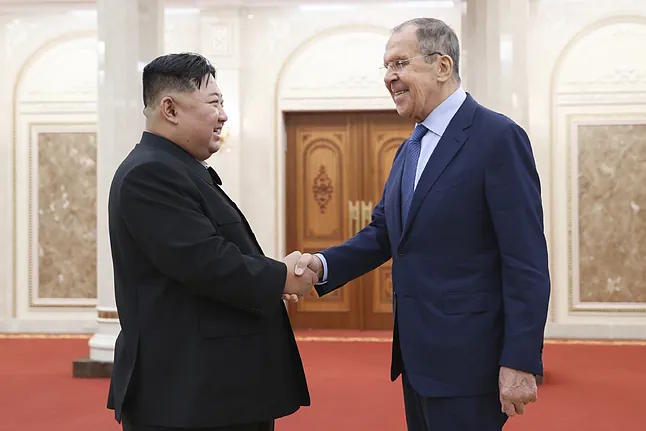While Russia continues to launch record waves of drones and missiles against Ukraine, and from Washington a frustrated Donald Trump unsuccessfully tries to pressure Vladimir Putin to end the war, Moscow's military alliance with the Kim Jong-un regime is once again in the spotlight with a visit to North Korea by the Russian Foreign Minister, Sergei Lavrov.
In recent years, it has been routine for high-ranking Russian officials to travel to strengthen ties with Pyongyang, which supplies thousands of troops and ammunition to Russia in exchange for economic assistance and military technology for the development of the nuclear and ballistic missile programs.
Lavrov landed on Friday in Wonsan, on the east coast of North Korea, where Kim opened a mega-resort this month with the aim of boosting tourism in a country that continues to maintain its tight border closures and where only a few tourist groups, mostly from Russia, have entered since the pandemic. The Russian guest stayed at a luxury beachfront hotel.
Putin's envoy held "strategic talks" on Saturday in Wonsan with his North Korean counterpart, Choe Son Hui. When asked at a press conference about the possibility of a greater presence of North Korean troops in Russia, Lavrov did not rule it out and highlighted Kim's regime's support for Putin. "We exchanged positions on the situation surrounding the Ukrainian crisis. Our Korean friends confirmed the unequivocal support for all the objectives of the special military operation," he stated about his meeting with his North Korean counterpart. The Russian also revealed that his government plans to erect a monument in honor of the fallen North Korean soldiers in Kursk.
Before his stroll through Kim's resort complex, Lavrov was in Malaysia participating in several meetings within the framework of an ASEAN (Association of Southeast Asian Nations) summit, where he had a 40-minute meeting with the US Secretary of State, Marco Rubio.
Lavrov's visit to North Korea follows a trip in June by Russia's top security official, Sergei Shoigu, who met with Kim before announcing that Pyongyang would send thousands of military construction workers and deminers to the Russian region of Kursk to help rebuild the area devastated by the war.
Lavrov's last visit to Pyongyang was in June 2024, when he accompanied Putin to sign a mutual defense agreement with Kim under which the North Koreans, just three months later, began moving over 11,000 soldiers to fight on the Kursk front. Now, according to a recent intelligence assessment from South Korea, the North is preparing to triple the number of soldiers fighting for Moscow: between 25,000 and 30,000 additional troops who will arrive in Russia in the coming months.
Last April, Seoul's intelligence agency, the National Intelligence Service (NIS), stated that the North Korean regime had suffered around 4,700 casualties, including 600 deaths. A few weeks ago, Kim Jong-un reaffirmed his "unconditional support" for Putin's war. "The army and people of North Korea will invariably support and encourage the just cause of the Russian army and people to defend their sovereignty, security, and territorial integrity," emphasized the North Korean leader after presenting the first North Korean nuclear-powered submarine under construction.
Many international analysts suggested at that time that North Korea, an isolated, impoverished, and heavily sanctioned country, could only afford to build that submarine with Russia's help.
"Pyongyang is no longer limited to supplying Russia with labor and missiles. It is deeply integrating into Russia's war economy, sending thousands of workers to the heart of its drone industry and transforming the balance of power in Eurasia," states an analysis from the specialized newspaper Asia Times, which also mentioned that 25,000 North Korean workers are being sent to the Russian region of Tatarstan to assist with the production of Shahed drones.
Both countries share deep ties dating back to the Korean War when the Soviet Union, along with China, supported North Korean forces against the United States, which, under the mandate of the United Nations, quickly intervened to defend South Korea. Until the Russian invasion of Ukraine, Pyongyang's survival maintained an extreme dependence on Beijing, its main economic lifeline. Therefore, and given China's recent distancing, Kim may have placed a strong bet on Russia.
Lavrov's weekend stroll in Pyongyang coincided with joint military exercises being conducted in the region by the armies of South Korea, the United States, and Japan, who continue to expand their joint military maneuvers as a deterrent against North Korea's growing nuclear arsenal. On Friday, senior military officials from the three allies discussed in Seoul the deployment of North Korean troops in Russia and the transfer of Russian military technology to Pyongyang.
